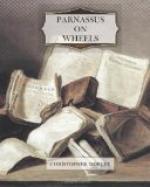“Well!” I said. “You are a cool hand! It’s a good job for you that you didn’t stay a schoolmaster. You might have taught your pupils some fine deviltries! And at your age, too!”
I’m afraid my raillery goes a little too far sometimes. He flushed a bit at my reference to his age, and puffed sharply at his pipe.
“I say,” he rejoined, “how old do you think I am, anyway? Only forty-one, by the bones of Byron! Henry VIII was only forty-one when he married Anne Boleyn. There are many consolations in history for people over forty! Remember that when you get there.
“Shakespeare wrote ‘King Lear’ at forty-one,” he added, more humorously; and then burst out laughing. “I’d like to edit a series of ‘Chloroform Classics,’ to include only books written after forty. Who was that doctor man who recommended anaesthetics for us at that age? Now isn’t that just like a medico? Nurse us through the diseases of childhood, and as soon as we settle down into permanent good health and worldly wisdom, and freedom from doctors’ fees, why he loses interest in us! Jove! I must note that down and bring it into my book.”
He pulled out a memorandum book and jotted down “Chloroform Classics” in a small, neat hand.
“Well,” I said (I felt a little contrite, as I was sincerely sorry to have offended him), “I’ve passed forty myself in some measurements, so youth no longer has any terrors for me.”
He looked at me rather comically.
“My dear madam,” he said, “your age is precisely eighteen. I think that if we escape the clutches of the Sage of Redfield you may really begin to live.”
“Oh, Andrew’s not a bad sort,” I said. “He’s absentminded, and hot tempered, and a little selfish. The publishers have done their best to spoil him, but for a literary man I guess he’s quite human. He rescued me from being a governess, and that’s to his credit. If only he didn’t take his meals quite so much as a matter of course....”
“The preposterous thing about him is that he really can write,” said Mifflin. “I envy him that. Don’t let him know I said so, but as a matter of fact his prose is almost as good as Thoreau. He approaches facts as daintily as a cat crossing a wet road.”
“You should see him at dinner,” I thought; or rather I meant to think it, but the words slipped out. I found myself thinking aloud in a rather disconcerting way while sitting with this strange little person.
He looked at me. I noticed for the first time that his eyes were slate blue, with funny birds’ foot wrinkles at the corners.
“That’s so,” he said. “I never thought of that. A fine prose style certainly presupposes sound nourishment. Excellent point that... And yet Thoreau did his own cooking. A sort of Boy Scout I guess, with a badge as kitchen master. Perhaps he took Beechnut bacon with him into the woods. I wonder who cooked for Stevenson—Cummy? The ‘Child’s Garden of Verses’ was really a kind of kitchen garden, wasn’t it? I’m afraid the commissariat problem has weighed rather heavily on you. I’m glad you’ve got away from it.”




